
by: Doris Santarone
Essay #1: Friday the 13th
Background
Several theories have been proposed about the origin of the Friday the 13th superstition. One theory states that it is a modern amalgamation of two older superstitions: that thirteen is an unlucky number and that Friday is an unlucky day. In numerology, the number twelve is considered the number of completeness, as reflected in the twelve months of the year, twelve hours of the clock, twelve gods of Olympus, twelve tribes of Israel, twelve Apostles of Jesus, the 12 Descendants of Muhammad Imams, etc., whereas the number thirteen was considered irregular, transgressing this completeness. There is also a superstition, thought by some to derive from the Last Supper or a Norse myth, that having thirteen people seated at a table will result in the death of one of the diners. Friday has been considered an unlucky day at least since the 14th century's The Canterbury Tales, and many other professions have regarded Friday as an unlucky day to undertake journeys, begin new projects or deploy releases in production. Black Friday has been associated with stock market crashes and other disasters since the 1800s. It has also been suggested that Friday has been considered an unlucky day because, according to Christian scripture and tradition, Jesus was crucified on a Friday. One author, noting that references are all but nonexistent before 1907 but frequently seen thereafter, has argued that its popularity derives from the publication that year of Thomas W. Lawson's popular novel Friday, the Thirteenth, in which an unscrupulous broker takes advantage of the superstition to create a Wall Street panic on a Friday the 13th. Records of the superstition are rarely found before the 20th century, when it became extremely common. The connection between the Friday the 13th superstition and the Knights Templar was popularized in the 2003 novel The Da Vinci Code. However, experts agree that this is a relatively recent correlation, and most likely a modern-day invention. Although according to many Freemasons, this date corresponds with the slaughtering of the Knights Templar by the Church. (http://en.wikipedia.org/wiki/Friday_the_13th)
Problem
Show that for any year, there must be at least one and at most 3 months for which the 13th of the month falls on Friday.
Let's look back at previous years and forward to future years to see that this statement is true. Here is a table dating back to 1973 and looking forward to 1925.
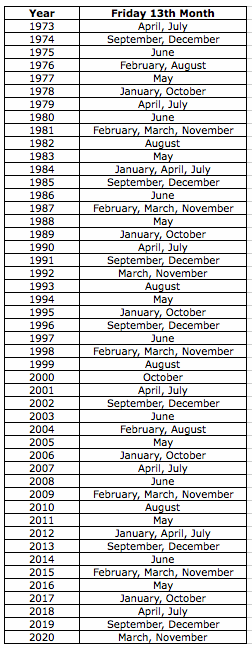
As we can see, each year contains at least one Friday the 13th and no more than three Friday the 13ths. Let's prove that this will happen. To do this, I will use modular arithmetic. Click here to learn more about modular arithmetic.
Using Modular Arithmetic to Solve "Friday the 13th Problem"
To tackle this problem, I want to list out the 13th day of each month (all of the possible Friday the 13ths). I also want to write the corresponding day of the year for each of these. To do this, I will assume that January 1 is the 1st day of the year.
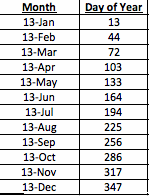
Now, I want to see which day of the week (Monday, Tuesday, Wednesday, etc.) these days fall on. In order to do this, I will use modulo 7. In Microsoft Excel, use the command "MOD(number, divisor)", in our case "MOD(day of year, 7)".
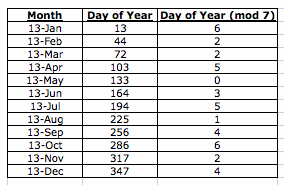 Click here to see the Micosoft Excel spreadsheet.
Click here to see the Micosoft Excel spreadsheet.
As you can see, January 13th falls on the 6th day of the week. February 13th falls on the 2nd day of the week, and so on. Now, we have to be careful to not assume that the first day of the week is Monday (or Sunday). The first day of the week would be whatever day January 1st (the first day of the year) falls on.
We can see from the table that that within one year, there will be one 13th that falls on the 1st day of the week, three 13ths fall on the 2nd day of the week, one 13th falls on the 3rd day of the week, two 13ths fall on the 4th day of the week, two 13ths fall on the 5th day of the week, two 13ths fall on the 6th day of the week, and one 13th falls on the last day of the week.
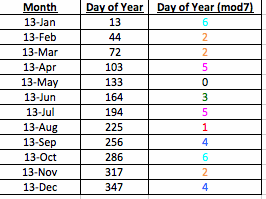
This shows us that at least one, but no more than three, "13ths" fall on any given day of the week.
Further, if I know the day of the week that January 1st is on, I can determine exactly how many of these 13ths will fall on a Friday and which months they will fall in.
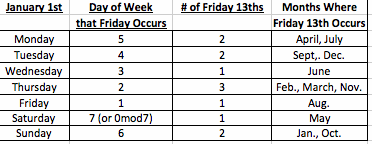
Extension
Every 4 years, we have Leap Years. A leap year is a year containing one extra day in February in order to keep the calendar year synchronized with the astronomical or seasonal year. Since all of our work was based on the day of the year that each 13th falls on, then our reasoning would not be true on Leap Years. See below for the data on a Leap Year:
 Click here for this Excel Spreadsheet.
Click here for this Excel Spreadsheet.
Even in a Leap Year, there will be at least one and at most 3 months for which the 13th of the month falls on Friday.